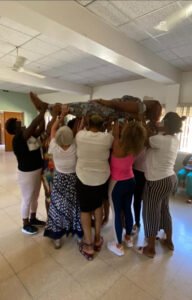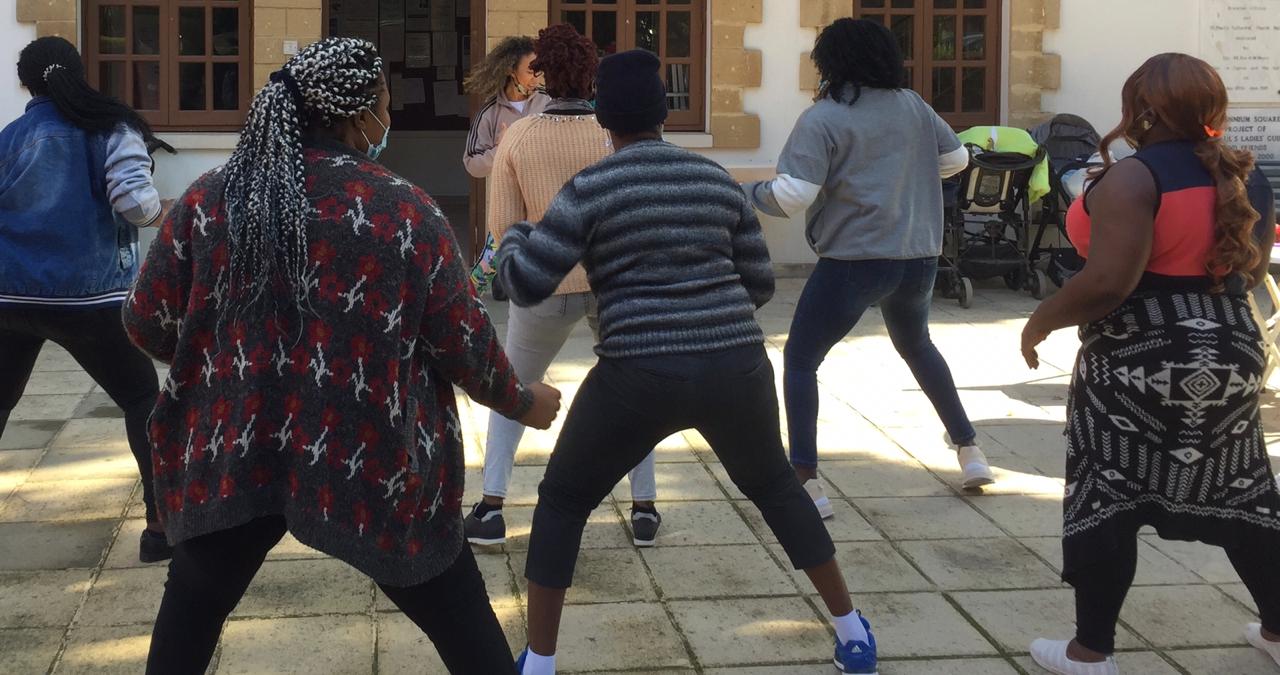By escaping reality and learning to touch in a positive way two people in Cyprus are trying to help trafficking victims and others overcome trauma through dance
Dance as therapy. You’ve no doubt heard of it before. But what you may not realise is that dance is an invaluable tool for those who have suffered abuse, trauma or violence.
We’re not talking the odd family disagreement in a privileged household (horrible though that may be), but women who have been trafficked for sex their entire lives, orphans who have seen their parents die before their very eyes, or refugees escaping from war-torn countries.
“Dance,” says 35-year-old Leanne Hudson, “is wonderfully therapeutic. You open up, you sweat, you release endorphins. You regain a sense of control over your own body, and learn once more to trust and work with others – you become part of a team. And if you’ve had everything taken from you, even your belief in yourself and your individuality, it rebuilds self-worth and confidence.”
Leanne, a qualified Dance Outreach Manager who spent over a decade in the UK working with marginalised groups, has recently moved to Cyprus. And, in cooperation with Haris Marathefti – a Professional Dance Teacher – she has set up Kinesis, a project to directly help marginalised communities through the medium of contemporary dance.
The duo are already working with those in various shelters around the island, including trafficked women and unaccompanied asylum seekers and, over time, hope to grow the project to include refugees, prisoners, victims of domestic abuse, children who have been sexually exploited, and those suffering from mental health conditions.
“But the issue is funding,” says Leanne. “Things seem to move very slowly here in Cyprus, and of course Covid doesn’t help. It’s a bit of a shock to the system! In the UK there was always funding available to help marginalised communities. How someone arrived in the country, their status, background or nationality – these things weren’t important; there was always a strong aid network, with classes and projects accessible to those in need. But here, it’s a different ballgame.”
Nevertheless, Leannne and Haris remain undeterred – they’ve seen the beneficial effects of contemporary dance themselves, and are determined to get their project off the ground.

“Imagine,” she continues, “being a woman who’s known nothing but sex trafficking your whole life. You’re finally free, but you’re in a foreign country, probably with a child – for whom you can’t provide – as a result of your past. And you’re still living the horror of your experiences through every waking moment, every interaction and conversation.
“It’s such a horrible situation and, as a mother myself, it breaks my heart to know what these women and children have suffered,” she adds. “But understanding and empathy are not enough. That’s why Haris and I formed Kinesis: to actively help people overcome past trauma through the provision of transferrable skills, giving those in need a voice, and a sense of achievement; the confidence to hold a conversation, apply for a job, return to society.”
The beauty of contemporary dance, Leanne suggests, is that anyone can do it. “It’s a form of dance that’s accessible to everyone, even those who’ve never danced a step in their lives! It doesn’t discriminate by gender, by size or shape or weight, physical or mental ability, education, nationality or background. Instead, contemporary dance is versatile and inclusive. And, most importantly, it allows you share your story without speaking…”
Kinesis works on the principle of therapy through movement. “So many of those we work with have such traumatic pasts,” says Leanne, “that speaking the words out loud, healing through talk, becomes impossible. But dance creates a safe space in which victims of abuse can release their pain through movement.”
Leanne and Haris encourage participants to be creative and take ownership of their choreography and their work; teach their peers the skills they have learnt; and ultimately, perform their work in front of an audience. “And we’re seeing the same positive effects time and time again…
“When we began work in the Nicosia and Larnaca shelters with orphaned asylum seekers, we noticed that we’d walk into a room full of boys whose posture and presence were utterly defeated – hunched shoulders, no smiles, no energy. But then, within the first five minutes, you begin to see a change: posture lifts, energy rises, communication improves. And by the end of that first class, there’s smiles and interaction!
“A lot of what we do at Kinesis,” she continues, “is contact work. This reinforces the notion that physical contact can be a positive thing. So many of the participants have experienced trauma and violence and abuse. We rebuild confidence through trust exercises and focus games; we do really physical lifts; and participants are encouraged to work together as a team to support an individual.”
Currently, Kinesis is conducting various classes around the island, delivering free taster sessions, and volunteering with charities and shelters such as Room For Hope. But with funding, says Leanne, they hope to improve their scope, offering an increased number of classes to more groups, and adding pastoral duties (including free medical, legal, and other advice) through a growing network of caring professionals.
“We’re operating on a shoestring,” she acknowledges. “It’s all volunteer work at the moment, so we’re looking for the financial support that allows this project to become a self-supporting charity which helps marginalised members of our society become productive members of society.
“Dance allows those who have suffered incredible trauma to be free in the moment, to tell their stories in a positive way, and to heal past hurts. I’m hoping,” she concludes, “that in time, Kinesis will be able to help hundreds of people across Cyprus to be able to regain their lives.”
For more information, visit the Facebook page ‘Kinesis Project’, email [email protected] or [email protected], or call 97 735 344 or 99 687 760







Click here to change your cookie preferences